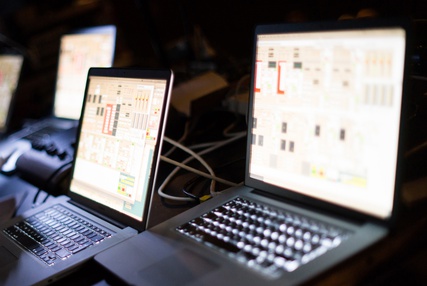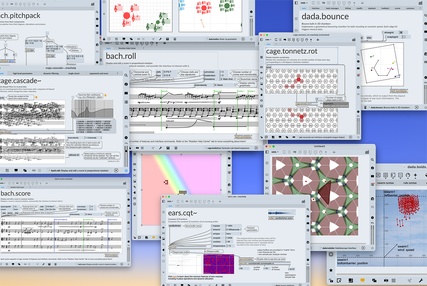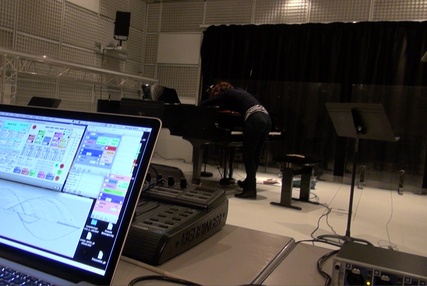10h00- 16h30, jeu 19 mars 2026,
10h00- 16h30, jeu 26 mars 2026,
10h00- 16h30, jeu 2 avril 2026,
10h00- 16h30, jeu 9 avril 2026,
10h00- 16h30, jeu 16 avril 2026,
10h00- 16h30
Anglais
Initiation
Tarif plein
:
690 €
Mbre Forum Premium
:
485 €
Étudiant.e
:
345 €
Orchidea est un environnement logiciel qui permet de calculer les meilleures combinaisons de sons orchestraux qui correspondent à un son cible en spécifiant certaines contraintes. En d'autres termes, il s'agit d'un processus qui génère une partition à partir d'un son cible donné.
![]()
Objectifs pédagogiques
À l'issue de la formation, les stagiaires auront acquis les connaissances techniques et esthétiques que mobilise Orchidea. Ils et elles seront capables d’utiliser la librairie Orchidea pour réaliser des séquences sonores ou des partitions.
Public concerné
Compositeurs, compositrices, musiciens, musiciennes, enseignants, enseignantes et toute personne créative ayant un socle de connaissances musicales et en informatique musicale, souhaitant s’approprier des outils d’orchestration assistée par ordinateur.
Prérequis
- Maitrise de l’anglais à l’écrit et à l’oral (niveau B2 requis).
- Pouvoir justifier d'un socle de connaissances et de compétences suffisantes sur Max et son environnement ou avoir suivi le stage Max Initiation, et avoir une pratique régulière du logiciel.
- Bonne connaissance d’un logiciel de gravure (Finale, Sibelius, Dorico…)
- Pouvoir justifier d'un socle de formation musicale permettant de comprendre les enjeux de l’orchestration,
- Bonne connaissance d'un séquenceur logiciel (station de travail audio-numérique DAW) type Pro Tools, Logic Pro ou autre et d'un logiciel d’édition audio (WaveLab, SoundStudio, Adobe Audition...).
- Maîtrise de l’utilisation des principales fonctionnalités de l'ordinateur Apple (connaissance et manipulation du clavier et de la souris, créer et gérer des fichiers et des dossiers, naviguer dans les menus, lancer une application).
- Des notions élémentaires en mathématiques faciliteront la compréhension : nombres entiers, rationnels et décimaux, sommes, soustractions, multiplications, divisions, valeur absolue, étude de fonctions simples et définition d’une fréquence.
- Il est recommandé de visiter le site www.orch-idea.org avant la formation.
Durée de la formation et modalités d’organisation
15h, tous les jeudis de 14h à 16h30 du 12 mars au 16 avril 2026
Formation en ligne, en anglais
10 stagiaires maximum
Programme de la formation
Certains détails du programme de la formation peuvent être révisés en fonction des évolutions du logiciel sur lequel il repose.
Des exercices à réaliser sont donnés à la fin de chaque séance et seront corrigés collectivement lors de la séance suivante.
Jeudi 12 mars
- Exposé sur le background esthétique et technologique de l’Orchestration Assistée par Ordinateur (OAO) (1ere partie).
- Initiation rapide à la librairie Bach autour des éditeurs bach.roll et bach.score.
- Installation d’Orchidea
- Exercice : réaliser une séquence musicale dans bach.roll.
Jeudi 19 mars
- Exposé sur le background esthétique et technologique de l’OAO (2e partie).
- Réaliser une orchestration statique.
- Exercice : réaliser une séquence musicale basée sur des orchestrations statiques.
Jeudi 26 mars
- Comprendre les paramètres de l’algorithme en détail.
- Orchestration dynamique.
- Exploration des solutions.
- Exercice : réaliser une séquence musicale basée sur des orchestrations dynamiques.
Jeudi 2 avril
- Créer sa propre base de données.
- Réaliser des séquences sonores à partir du bach.roll.
- Exercice : réaliser une séquence musicale basée sur des orchestrations réalisées avec une base de données personnelle.
Jeudi 9 avril
- Qualités timbrales de l’orchestration.
- Exercice : réaliser une séquence musicale où les qualités timbrales évoluent.
Jeudi 16 avril
- Orchidea en ligne de commande.
- Créer un workflow pour éditer et exporter une partition : introduction à la quantification avec bach.quantize, introduction à la librairie Cage.
Moyens pédagogiques et techniques
- Cette formation professionnelle se tiendra en ligne.
- Besoins techniques : il est demandé de télécharger Orchidea, la librairie Bach et Max 9 (version démo valables 30 jours avec les fonctionnalités complètes) en amont de la formation. Il est recommandé de visiter le site www.orch-idea.org avant la formation.
- Pour suivre la formation dans les meilleures conditions, il est nécessaire d’utiliser deux écrans et une bonne connexion à internet.
- Format de la formation : la formation est dispensée en anglais et alterne entre des exposés théoriques, l'étude d'exemples à analyser et des travaux pratiques.
- Supports pédagogiques : présentations, un support de cours sera remis au début de la formation et des fichiers complémentaires seront fournis au fur et à mesure.
Suivi
- Session technique le premier jour de la formation pour vérifier l’installation des stagiaires.
- Contrôle du suivi par la signature d’une feuille de présence pour chaque demi-journée.
- Remise d’un certificat de réalisation.
.Évaluation
- Évaluation des acquis sous la forme d’un QCM, à remplir dans la semaine qui suit la fin de la formation.






